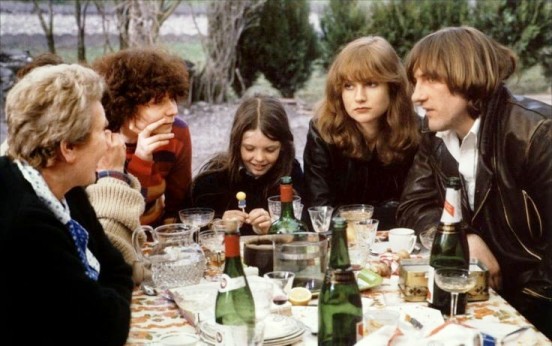
 The story of an affair between a young upper middle class woman (Isabelle Huppert) and a working class ex-convict (Gérard Depardieu) explores the contrast between a detached intellectual approach to life and a full physical engagement with it.
The story of an affair between a young upper middle class woman (Isabelle Huppert) and a working class ex-convict (Gérard Depardieu) explores the contrast between a detached intellectual approach to life and a full physical engagement with it.
Loulou, a 1980 film by French director Maurice Pialat, tells of an upper middle class woman named Nelly (played by Isabelle Huppert), who grows tired of her selfish, abusive boyfriend (Guy Marchand) and leaves him to be with an unemployed ex-con nicknamed Loulou (played by Gérard Depardieu). The sex between them is great, but the difference in class poses problems. Loulou’s limited intellectual outlook leaves little room for Nelly to express herself, and their fights never resolve. Yet there’s something about the attraction that transcends every other interest.
Pialat, one of the unsung geniuses of modern film, was a perfectionist whose mastery of the naturalistic style gives the lie to the notion that realism has to be dull. The pacing in Loulou is never too slow or too fast—Pialat’s respect for the complexities of character allows the actors to fill their roles, and the characters’ actions to flow, with a conviction and clarity that seems inevitable. He always cuts on movement, lending the transitions an ease that blends with the viewer’s thought.
A striking example of this technique is a lengthy backyard picnic scene in which Nelly is introduced to Loulou’s relatives. Rarely does one witness a scene so natural and yet so rich in detail. The fly-on-the-wall effect, as if we were simply observing people behave, disguises the vibrant energy and gentle humanism of the style. Since a moral point of view is not imposed on the characters, we’re allowed to see them in their varied aspects. Marchand’s boyfriend character can be infuriating, but his sadness, need, and genuine concern for Nelly also come through. In the title role, Depardieu expertly conveys the heedless and inarticulate attitude of a man with little regard for the future. It’s a tribute to his skill as a performer, as well as to the intelligence of the direction, that Loulou isn’t a mere symbol of Nelly’s desire, but resists the easy judgments that we are tempted to make of him. Finally, it is Huppert who centers the film—at 25 she was already a powerful presence—with her shifting moods, laughter, confused impulses and mental sharpness. Not a victim, villain, or saint, Nelly is very much the author of her own decisions and mistakes. There’s no plot in the usual sense, but there’s a certain logic to the way the relationship develops between Nelly and Loulou.
Apparently autobiographical in content (it was co-written by Pialat and his ex-lover Arlette Langmann), the movie satirizes the comfort and prosperity of people who are out of touch with what it means to be alive, contrasting this with the risk and messiness of real emotional engagement. The picture has a reputation for being really sexual, but it seems to me that it merely gives sex its due as a vital need and a necessary aspect of a relationship. It’s not exaggerated or invested with undue significance. Overall, the honesty of Pialat’s approach to narrative, his careful avoidance of dramatic convention, gives his work a freshness that invigorates and delights the mind. The picture doesn’t evoke facile emotional responses. It feels neither joyous nor depressing, but simply and satisfyingly real.
Loulou is available on DVD.

